- Home
- Ian McDonald
Ares Express dru-2 Page 18
Ares Express dru-2 Read online
Page 18
“Is the tune bad?” Grandmother Taal asked.
“Not bad,” the band leader said. “Strange. The lyrics are challenging.”
Grandmother Taal wanted to inquire deeper, but manners prevented her. Her curiosity—a strong trait among Engineer females—had been intrigued after the great leader told her his ensemble was on a mission of some musical urgency, but a Gubernatorial Pleasance hardly seemed to justify prioritairing a song score into the very arse-end of Great Oxus. Though Chimeria had always been an odd place, and, since the recent elections, grown stranger. Cossivo Beldene, the water and bingo magnate, had swept to power on a populist gusher of regional pride and xenophobia. Grandmother Taal had paid as little and as much attention to the news as any trainperson; insofar as the doings of Passengers impinged on sacrosanct timetables and local contract tariffs. As a child of a long long lineage, she could understand what warmed the people of Chimeria and Solstice Landing in his orations of ancient traditions submerged by candy-coloured kultur and regional identity broken into bite-sized lumps by the hammer of social diversity and dusted with multicultural frosting. As a member of a brown-eyed, coffee-skinned, black-haired mongrel race, boisterous and fecund and fizzing with hybrid vigour, she found this talk of separation and racial purity eugenically unhealthy. She had seen the results of inbreeding laid in dozens of unmarked trackside scrapes. Engineers were a marrying-out people.
That thought took her both backward and forward. Back to her last sight of her granddaughter, standing with one foot cocked back against the drive wheel at the big steaming, chapatti in one hand, plastic glass of beer in the other and that sullen, sullen look in her eye Grandmother Taal admired so much, for properly used it would earn her anything she wanted in this world. Forward to Molesworth, where the Glenn Miller Orchestra would play at Cossivo Beldene’s Inaugural Pleasance, and where, in the intestinally convoluted footways of the old crater port, she might find the Church of the Ever-Circling Spiritual Family, and glimpse that wanting, dark look in a passing eye.
The photograph caught that look right, Grandmother Taal thought, as it was passed from hand to hand around the bus. Dark, demanding, promising. Men found that look irresistible. But you are just learning that, Grandmother Taal mused. She noted the expressions on the bandsmen’s faces, the dilation of the pupils, the quiet, lewd comments as they looked at the girl. You should hear this, she thought at her granddaughter. You are being paid your due homage. You should know you are admired. Then you will begin to have a sense of your gifts.
The muted sax crept into Grandmother Taal’s sleep with such stealth that she was awake and listening for several bars before she knew it. Glenn Miller was perched on the back of the seat, conducting the soloists. Every lurch threatened to spill him into the first clarinets. The band was practising the new piece. Sheets of music were pin-lit by ceiling spots. The musicians frowned over peculiar passages; the singer, a small, fox-faced woman in clothes with too many fringes, hesitated over the words. They were indeed lyrically challenging. It seemed to have to do with oral sex, and to directly refer to the new Gubernator of Chimeria and Solstice Landing. Grandmother Taal wondered about their appropriateness for a state function. They seemed calculated to provoke political scandal, even law suits. She thought again about the express parcel plastered in priority seals. The timing had been too delicate for a pair of inbred rail-side postal workers. She tried to recall what she knew of Cossivo Beldene. He stood for…What had that slogan been, as oily on the ears, as easily in-and-out as any other? A human world for human beings. No gods, no saints, no angels, just our own hands. Owe nothing to no thing. Our hands, our lands. All manner of whispering money behind those slogans. Big people with big ideas, enough for everyone. Grandmother Taal was a citizen of a subtle and ubiquitous anarchy, with a distrust of dogmas and slogans eight hundred years deep. On principle, she would not vote for anyone who wanted to be elected. This new thing in the old heartlands alarmed her; more so, for the enthusiasm with which citizens, no more and no less political than her, had placed it in their hearts. She could understand how the subtle who ran the unsystem might wish Cossivo Beldene’s governorship terminated in infancy. She looked at the King of Swing, steadying himself with his feet on the bench seat, freeing his hands to count in the instruments. The most powerful government is the one that keeps anarchy in place. But a big band leader? Lulled by the narcotic scent of conspiracy, she dozed off again.
Cold woke her, and voices. The door was open, beams of light were shining up through the windows, darting around the ceiling. The voices had midlands accents and the grate of authority heavy weapons lend.
“Nothing for you here,” she heard Glenn Miller say.
“We’ll be the judges of that,” a man’s voice replied. A torch beam swung over the faces of the drowsing musicians, hugging their instruments. He clambered aboard. He was a big fat farmer, arrogant in his light-scatter armour. He held his General Issue field-inducer wand like an inseminating rod. Outside, his colleagues poked and scraped and thumped at the superstructure. Big Farmer fisted his wrist-light in the face of Second Trombone.
“What you got there?”
“Trombone. Aincha ever listened to the radio?”
“Just the stock prices. Some ID.”
“You what?”
“Something that says you are who you say you are.”
“And who the hell do you think I might be, with this piece of tin under my arm?”
“You could be a subversive.”
“I’m a jazz musician. I’m supposed to be subversive.”
“Show me something with your face on it.”
Second Trombone tetchily handed over his Musician’s Union card. As Big Farmer scrutinised it, a familiar instinct for sedition made Grandmother Taal pop open her carry-all bag, slip out her hand and quietly slide inside the scurrilous song score.
“Eh. You.”
“Are you speaking to me, young man?”
“Did you put something in your bag?”
Big Farmer shot his beam in Grandmother Taal’s face.
“What kind of manners have they got in this place, waking good women up and shining bright lights in their faces?”
“This is Chimeria, old woman, and we’ve Chimerian manners enough for Chimerian people. Your bag.”
Grandmother Taal presented it to him sure in the knowledge that, being a man, he could never master the trick of its nested dimensions. His cow-inseminator’s fingers hooked out trinkets, coin-purses, lip balm, pain-killers, pens, nail scissors. They did not find the sheet music, seven and a half dimensions away. Big Farmer snapped the clips, returned the bag with poor grace, moved to the next.
“How did you do that?” Glenn Miller whispered when Big Farmer had worked his way down to the end of the tour bus.
“Old women’s stuff,” Grandmother Taal replied.
“I owe you,” the band leader said.
Satisfied that there was no subversion on this vehicle, Big Farmer clumped off and waved the orchestra on.
“Who are those men?” Grandmother Taal asked Glenn Miller as she returned his big production number to him. She counted twenty sets of lights, back there in the miles-from-anywhere.
“Call themselves the Chimerian Yeomanry,” the band leader replied. “Keeping their country a good place for law-abiding folk.”
“That was a border, then, that we passed.”
“Seems so.”
Grandmother Taal shuddered. Men with weapons, like borders, and that some people and things could be subversive, in her world-view were unthinkables almost as great as that the sun might fail to rise, or the moons really were a hare and a desert mouse. Though there were no other unscheduled stops that night, the Chimerian Yeomanry had trailed a dust of misgiving through the bus. Welcome was no longer universal or automatic. There were unseen lines of behaviour in the soil. This side of the hill could admit you, the other turn you away. That blade of grass trusted you were who you claimed, but that tree suspected all
manner of crimes. This stone would sleep blindly as you drove over it, that one call out men with field-inducers to blast you to nothing. Grandmother Taal eventually found sleep in the subdued bus, but it was grey and broken.
Dawn found the Glenn Miller Orchestra On Tour steering through the staggering landscapes of industrial dereliction of Central Solstice Landing. The craters had been left raw and un-manformed, their crenellated rims studded with guidance radars and command and control bunkers. Once-proud launch towers were spillikins of rusted steel, trellises for creepers and clematis. The grasslands were starred with the glassy scars of tailbursts, healing for a thousand years and still only half-scabbed over. This was a land recovering from a long divorce with the sky. Here feet first walked on the world, in the so-long-ago that it had passed from history into legend. For a thousand and some years ships had come and gone from this cratered plain. Its ruler-straight runways and eroded laser-pits and the fallen arches of EM launch cradles were a chronicle of manned spaceflight. For half an hour the orchestra tracked along the side of the gentle slope of a ground-to-orbit sling-ramp. On the horizon a second could be seen, curving skyward. Ten more of the behemoth constructions, visible even from orbit, were arrayed around Solstice Landing like numbers on a clock. Grassed-over supercore cables finger-ridged the ground; the big bus laboured over them like a caterpillar over a saint’s sandal. Blast walls and baffle plates formed a convoluted cheval de frise; the big band lumbered through the shadow geometry of ship gantries and construction cranes. Whole industries had been abandoned to rust and rot, but no scavengers picked over the postindustrial corpses. No shortage of raw materials on this world of red iron deserts. The rib cages of dead ships rose from the lush grass, the bus’s big wheels clanked over a shed skin of hullplates. The sun rose high over the nose cones of loadlifters forever stogged shin-deep in the loess; corporate pennons from orbital haulage firms long since liquidated rattled raggedly in the edge-of-day breeze.
All would be let fall to rust if Cossivo Beldene and his fiscal masters turned their backs to the stars and closed the skyports. Sealed planet.
And the band played on. Cenotaphs to a space-age rose painfully on every side and the bus boogied its way toward the crater-gates of Molesworth to a medley of “Chattanooga Choo-Choo,” “Jackson River Stomp,” “Six-oh-seven-four-five-two,” “String of Pearls,” “Oysters’n’Ale,” “My Summer Love,” “In the Mood,” “After the Love Is Gone,” “South of the Border,” “Silver Star” and “Red Rose Rag.” And that brought the Glenn Miller Orchestra out of the sodium-lit entry tunnel, on to the in-bound arterial and into the warren of towers, tenements and old space-terminus architecture of Old Molesworth.
Grandmother Taal of course had visited this ancient city many thousands of times, but these narrow, canyon streets, through which the bus squeezed as if it were being born, were an alien world to her. Molesworth’s main station, like much of the city’s primal infrastructure, was underground, buffered from the fusion blasts of immigrant ships by good thick stone. Molesworth, ancient port and first capital of the world, with a reputation for no-nonsense dourness and graft, was celebrating in the same spirit. The streets had been slung with celebratory bunting in Cossivo Beldene’s Unity Rising Party’s red, black and green; racks of fireworks were fixed to every balcony rail to ejaculate electoral triumph into the sky; bloated piñadas in the shape of the Gubernator swayed from the streetlights, to be split open at the perfect moment and shower the upturned faces with gifts from their distended bellies. The Glenn Miller Orchestra advanced through the jubilee. Its reputation had gone before it: kids crammed the tiered tenement balconies to danger-point, teenagers wearing favourite album covers on their heads like mitres paced the slow, lumbering bus. Shoppers in the arcades waved, startled that a piece of real legend was fighting its way through their quotidian streets. Coffee sellers and nimki vendors angrily pushed their carts out of the big band’s path, then read the name on the side and heard the jive coming from within and knew a little glow of pride that their Gubernator could command the biggest and the bestest. As it negotiated the lanes, the boogie bus’s whip aerials set wash-day blues swinging from ’tween-verandah lines, mud-flaps spilled barrows of oranges and sent daily scandal sheets flapping on the eccentric winds that inhabited the labyrinth. Goondahs and urchins jeered and pelted the windows with street-dung. The bus driver, grinning manically beneath her goggles, hooted furiously at them. Glenn Miller, with a musician’s fine disregard for niceties, signed for his brass section to blow all the harder. Grandmother Taal was handjiving with the rest (Mother’a’mercy, it didn’t hurt!) when the driver pulled on the brake and the band jolted to a halt under the tradesperson’s entrance of Molesworth’s venerable High Rathaus. It was an expansive, rambling building, like a fat old great-grandparent who cannot quite control his limbs on the sofa and sprawls all over his neighbours, built on many levels over and under and through the surrounding buildings. Civic Guilders in velvet knee breeches led the band members through a labyrinth of corridors, staircases, halls and lobbies to the main festhall. Leaving Grandmother Taal standing by the bus clutching her bag, looking up at the overhanging galleries and orioles of the Rathaus and the black doorway that had swallowed an entire big band.
Glenn Miller beckoned to her.
“Come on.”
“I have a granddaughter to find.”
“That you surely do, but I don’t think you even have an idea where to begin.”
“The Church of the Ever-Circling Spiritual Family has a mail-order department here.”
“The Church of the Ever-Circling Spiritual Family will be at the Pleasance,” Glenn Miller said. “Devastation Harx was a major contributor to Beldene’s election fund.”
“How do you know this?” Grandmother Taal said warily.
“I’ve got my own bag of secrets.” This last with a glitter behind the pebble glasses. “Come on. If nothing else, you need to eat. And anyway, I owe you, remember?”
A big band setting up is of marginal interest to non-musicians so after her mint tea and morning rolls Grandmother Taal asked a velveteen usher to show her the way to the street and she spent the morning wandering affably confusing alleys looking for anything church-like, ever-circling, or spiritually familial. She found nothing fitting those criteria, and the one mail-order warehouse she came across shipped hand-made fetishwear, but she did catch a curious climate in Molesworth’s decked laneways. A city’s mood is a subtle thing, divided among many people and activities, but it showed itself in glances, habits, touches; details of life. Heaped in the middle of a street Grandmother Taal found a dead machine, some indeterminate civic servitor, now terminated. Molesworthians skirted around it without regard or respect. No one had shown even the small grace to close its gaping ports and sockets. Grandmother Taal could not rid herself of the suspicion that it had been murdered. And the parasols! On a grey day of overcast. Silk white parasols, citizens huddling from the sky. All along the Marche shop awnings were pulled out in a continuous swoop of striped canvas, on Long Drag and Steel Market the sunny central strips of the streets were deserted, the morning shoppers clinging to the shade of the arcades. Over morning tea in a dusty plaza encircled by top-heavy tenements she tuned between conversations with the practised discrimination of the elderly. Grazestock prices could be better. Aye, and a bad turn of the weather. In next week for the hip job, and couldn’t I do without it? Keep calling at the door and I’ve told them he hasn’t lived there in a halfyear but will they believe me? Tea’s not what it used to be; they scorch the leaves. Waited half an hour, half an hour, then three came at once and there were bloody kids rampaging all over them. Well, I for one won’t be out waving my little flag, waste of the taxpayer’s dollars, if you ask me. Strangers in town, and foreigners too. Nothing in the news these days: wireless soaps and pelota-players’ wives.
Trivial in themselves, these gripes and scraps betrayed the deeper climate of moaning that Grandmother Taal had sensed in Molesworth’s stre
ets. These were uneasy people. This was an uneasy grandmother, sipping her mint tea and decorously breaking her almond madeleines. A perpetual foreigner in every town she visited, this was the first time she felt like a stranger. As the waiter counted the change from his pouch, she asked him if he knew of a Church of the Ever-Circling Spiritual Family.
“No madam, but I do know now that they have a mail-order depot over in Sunny Mallusk. The brother works there.”
“And where might that be?”
He drew a map on the back of the receipt in silver pencil. It was a few hundred metres but many turns away. Grandmother Taal had to check with locals that she had taken the correct number of rights and lefts. Sunny Mallusk was a dour, yellow-brick huddle of tall, steep-gabled, small-windowed warehouses around a square in which litter rattled, stirred by a stable system of microtornadoes. Two Malluskers had never heard of the Church of the Ever-Circling Spiritual Family but a third had and directed her to a buff-coloured door with a hatch at eye level. Her knock was greeted by an eye at the hatch.
“Yes?”
“I’m looking for my granddaughter.”
“Who is?”
“Sweetness Octave Glorious Honey-Bun Asiim Engineer 12th,” Grandmother Taal said in one breath.
“Nah,” said the eye. “No one here by that name.”
“Are you sure?”
“I’d be sure.”
The tip of Grandmother Taal’s stick stopped the hatch from snapping shut.
“I don’t suppose a Mr. Devastation Harx is on the premises today?”
“You suppose correct.”
“But he is in town?”
“He’s up for the bash.”
“The Inaugural Pleasance.”
“Aye. That.”
“Will he be calling here?”

 Empire Dreams
Empire Dreams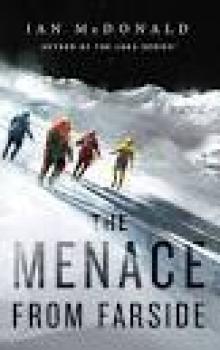 The Menace from Farside
The Menace from Farside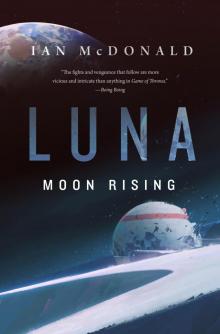 Luna: Moon Rising
Luna: Moon Rising Moon Rising
Moon Rising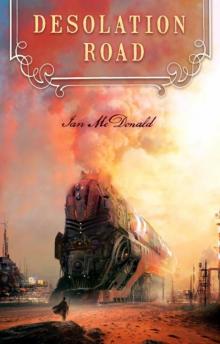 Desolation Road dru-1
Desolation Road dru-1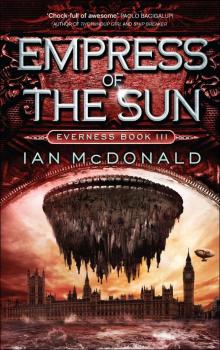 Empress of the Sun
Empress of the Sun Ares Express dru-2
Ares Express dru-2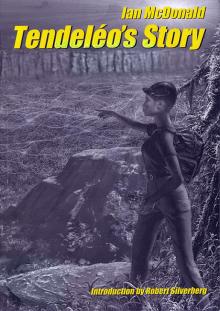 Tendeléo’s Story
Tendeléo’s Story River Of Gods
River Of Gods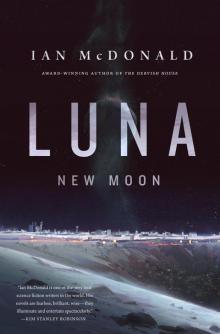 Luna
Luna![Cyberabad Days - [River of Gods 02] Read online](http://i1.bookreadfree.com/i1/03/29/cyberabad_days_-_river_of_gods_02_preview.jpg) Cyberabad Days - [River of Gods 02]
Cyberabad Days - [River of Gods 02]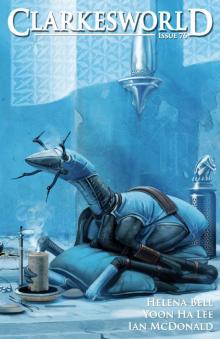 Clarkesworld Magazine Issue 76
Clarkesworld Magazine Issue 76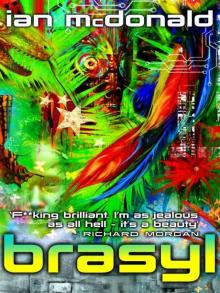 Brasyl (GollanczF.)
Brasyl (GollanczF.) Scissors Cut Paper Wrap Stone
Scissors Cut Paper Wrap Stone Chaga
Chaga Time Was
Time Was Cyberabad Days
Cyberabad Days Be My Enemy
Be My Enemy Changa
Changa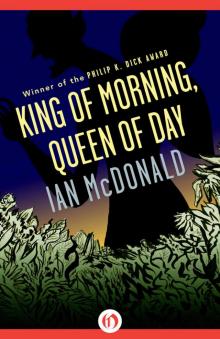 King of Morning, Queen of Day
King of Morning, Queen of Day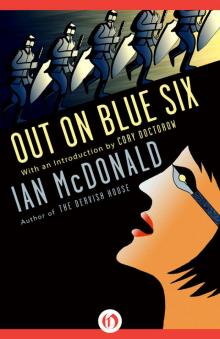 Out on Blue Six
Out on Blue Six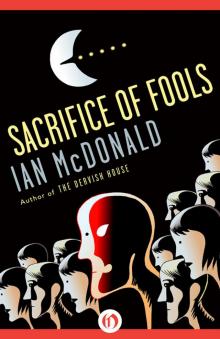 Sacrifice of Fools
Sacrifice of Fools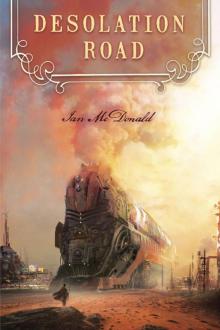 Desolation Road
Desolation Road Luna--Wolf Moon--A Novel
Luna--Wolf Moon--A Novel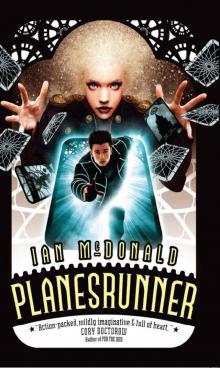 Planesrunner (Everness Book One)
Planesrunner (Everness Book One) Ares Express
Ares Express